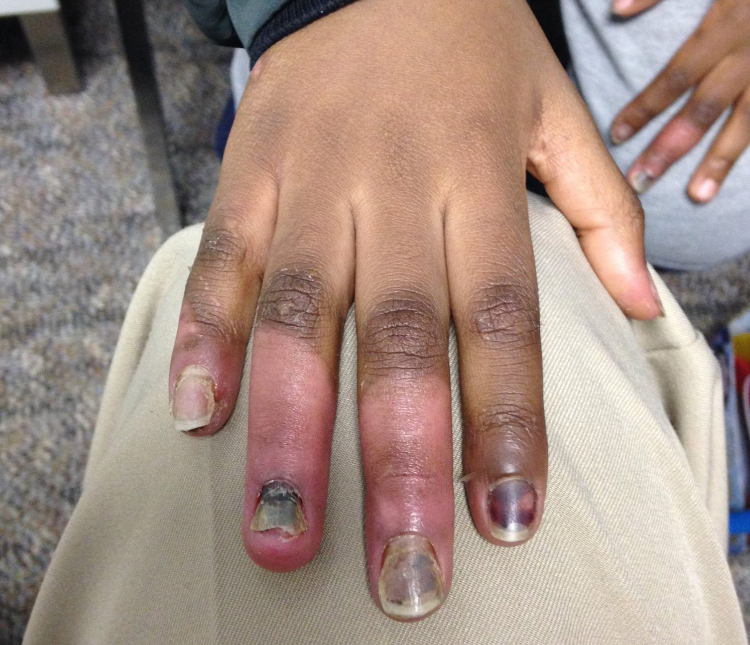On the outskirts of Toronto, a pregnant woman is dropped off on the side of the road. It’s bitterly cold and she’s only wearing a windbreaker.

In another case, a woman suffered severe frost bite on her fingers while protecting her children from the frigid temperatures of a Canadian winter.
For Dr. Paul Caulford, those are some of the harrowing stories that he and his team have encountered at the Canadian Centre for Refugee and Immigrant Healthcare, where they work to treat refugees from Ethiopia, Nigeria or Somalia. In recent weeks, there’s been a surge in the number of refugees crossing the U.S. border into Canada seeing asylum.
WATCH: Refugees brave freezing cold, walk to Canada to escape Donald Trump’s USA

Caulford, who runs the volunteer clinic in Scarborough, Ont., said in some cases his patients — almost entirely women and children — arrived in Ontario after being smuggled across the border in the back of a van or truck hidden behind boxes of televisions.
Caulford, a retired family doctor, says many of the people he’s treated, often for PTSD, respiratory problems or malnutrition, share a similar story of crossing the border in a truck before being dropped off in the Greater Toronto Area.
“They are dropping them on a remote road outside of Toronto telling them to wait, that another agent is coming, in sub-zero temperatures.”
READ MORE: Ghanaian community in Winnipeg comes together to help frostbitten refugees
Caulford said U.S. President Donald Trump’s travel ban and a growing sense of anti-immigration has led to an increase in refugees crossing the border to make asylum claims in Canada.
Officials across Canada have seen a sharp increase in the number of refugee claimants illegally crossing the U.S. border.
In Manitoba, the small city of Emerson has been grappling with a sudden influx of refugees into the town that borders North Dakota and Minnesota.
WATCH: US appeals court refuses to reinstate Donald Trump travel ban
Reuters reports that 430 asylum seekers crossed Manitoba’s border between April 2016 and the end of January 2017, up from 340 in the 2015-16 fiscal year and 68 in 2013-14.
Last weekend, 22 people crossed into Emerson, according to the RCMP.
In Quebec, 1,280 refugee claimants entered between April 2016 and January 2017, up from 424 the year beforem according to the Canada Border Services Agency. And in British Columbia and Yukon, 652 people entered Canada illegally in 2016, more than double the previous year.
READ MORE: Canada should suspend Safe Third Country agreement with the U.S. says B.C. group
- Life in the forest: How Stanley Park’s longest resident survived a changing landscape
- Bird flu risk to humans an ‘enormous concern,’ WHO says. Here’s what to know
- Roll Up To Win? Tim Hortons says $55K boat win email was ‘human error’
- Election interference worse than government admits, rights coalition says
Those crossing into Manitoba often face the freezing prairie winter to walk into Canada. In December, two men from Ghana who walked to Manitoba from the United States lost all their fingers to frostbite and nearly froze to death.
“People who are in a desperate position will do desperate things and it’s not necessarily because they don’t know they are running a risk,” said Janet Dench, of the Canadian Council for Refugees. “Often it’s because their options are so limited and so poor.”
Dench says the U.S.-Canada Safe Third Country Agreement is forcing people to make the perilous journey across the border.
“Everybody, including the governments of both sides, were aware that one of the impacts was that people would be pushed into making dangerous trips outside of border points because it would be for them to get to where they feel safe,” Dench said.
WATCH: Canadian immigration Minister on U.S. travel ban, refugees

The Safe Third Country Agreement (STCA) was introduced in 2004 and requires people to apply for asylum in the first of the two countries they arrive in to prevent the clogging of immigration systems. Advocates say the agreement inadvertently encourages people to sneak into Canada undetected and make a claim inland rather than risk being turned away at the border.
Caulford and Dench have joined other refugee advocates and immigration lawyers in asking the federal government to suspend the agreement in light of U.S. President Donald Trump’s travel ban and suspension of refugee claims announced two weeks ago.
A spokesperson for Immigration Minister Ahmed Hussen said the STCA remains an important tool for Canada and the U.S. in handling of refugee claims.
“The conditions of the Agreement continue to be met, and we are continuing to monitor the situation closely,” Camielle Edwards said in an email. “Foreign nationals who are claiming refugee status as they cross the border into Canada is a situation the Government of Canada takes seriously, and we are watching this situation along with our colleagues at CBSA.”
*With files from Reuters














Comments